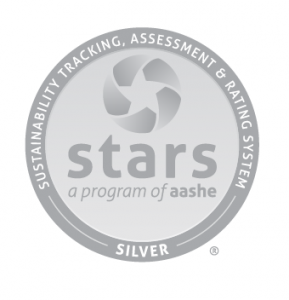Posted 10:08 a.m. Thursday, June 25, 2015

UW-La Crosse has earned a STARS Silver Rating in recognition of its sustainability achievements from the Association for the Advancement of Sustainability in Higher Education (AASHE).
 A culture of sustainability is emerging on campus. UW-L students have been strong advocates for it. Several student organizations sponsor sustainability-related projects on campus, including a sustainability newsletter, a fall and spring “sustainability event series” and the campus farmer’s market.[/caption]
UW-La Crosse has earned a STARS Silver Rating in recognition of its sustainability achievements from the Association for the Advancement of Sustainability in Higher Education (AASHE). STARS, the Sustainability Tracking, Assessment & Rating System, measures campus sustainability efforts from an economic, social and environmental perspective.
Participating in STARS allows UW-L to compare itself to about 700 other colleges and universities throughout the world that have received STARS ratings. STARS also gives the university a framework to set goals to improve sustainability. UW-L began tracking sustainability for STARS in spring 2014 and submitted its report in May. Institutions are recognized with either a bronze, silver, gold or platinum rating.
[caption id="attachment_41752" align="alignright" width="240"]
A culture of sustainability is emerging on campus. UW-L students have been strong advocates for it. Several student organizations sponsor sustainability-related projects on campus, including a sustainability newsletter, a fall and spring “sustainability event series” and the campus farmer’s market.[/caption]
UW-La Crosse has earned a STARS Silver Rating in recognition of its sustainability achievements from the Association for the Advancement of Sustainability in Higher Education (AASHE). STARS, the Sustainability Tracking, Assessment & Rating System, measures campus sustainability efforts from an economic, social and environmental perspective.
Participating in STARS allows UW-L to compare itself to about 700 other colleges and universities throughout the world that have received STARS ratings. STARS also gives the university a framework to set goals to improve sustainability. UW-L began tracking sustainability for STARS in spring 2014 and submitted its report in May. Institutions are recognized with either a bronze, silver, gold or platinum rating.
[caption id="attachment_41752" align="alignright" width="240"] Kelly Nowicki, associate lecturer of Management and STARS coordinator[/caption]
“We met our goal of achieving a silver rating," says Kelly Nowicki, associate lecturer of Management and STARS coordinator. "This says we’re doing a lot of things right, but we have room to improve. Now, we’ll look to make some of those improvements — some will be easy and others will require setting more long-term goals.”
UW-La Crosse’s STARS report is available online.
An institution’s STARS score is based on the percentage of points it earns across four main categories: operations, academics, engagement, and planning and administration. Nowicki and Rob Tyser, a UW-L faculty member who helped lead the STARS tracking, met with about 40 people across campus over the last year for assistance in collecting data.
STARS tracking provided numerous UW-L classes an opportunity to participate in data collection and analysis from surveying campus commuting patterns to gauging the student population’s understanding of sustainability. This was one of the most valuable aspects of the STARS program — it allowed students to use the campus as a “living laboratory,” says Tyser.
“This was a huge team effort across campus,” says Nowicki. “My biggest takeaway from this project was the people I met across campus who are all working hard for a great institution.”
Kelly Nowicki, associate lecturer of Management and STARS coordinator[/caption]
“We met our goal of achieving a silver rating," says Kelly Nowicki, associate lecturer of Management and STARS coordinator. "This says we’re doing a lot of things right, but we have room to improve. Now, we’ll look to make some of those improvements — some will be easy and others will require setting more long-term goals.”
UW-La Crosse’s STARS report is available online.
An institution’s STARS score is based on the percentage of points it earns across four main categories: operations, academics, engagement, and planning and administration. Nowicki and Rob Tyser, a UW-L faculty member who helped lead the STARS tracking, met with about 40 people across campus over the last year for assistance in collecting data.
STARS tracking provided numerous UW-L classes an opportunity to participate in data collection and analysis from surveying campus commuting patterns to gauging the student population’s understanding of sustainability. This was one of the most valuable aspects of the STARS program — it allowed students to use the campus as a “living laboratory,” says Tyser.
“This was a huge team effort across campus,” says Nowicki. “My biggest takeaway from this project was the people I met across campus who are all working hard for a great institution.”
 An area where UW-L excelled was the amount of academic research happening on campus surrounding sustainability. About 80 faculty or staff members from all three colleges are engaging in research projects surrounding sustainability — this is about 22 percent of faculty or staff members conducting research. UW-L scored the maximum amount of points it could in this area. The rating highlights how active UW-L faculty are with their research and their strong interest in sustainability, says Nowicki.
Another area where UW-L excelled was the number of courses with sustainability in the content — either as an overall theme or component of the course. That number reaches 224 total courses. Two UW-L curriculum programs are based on sustainability principles — the Environmental Studies minor in the College of Liberal Studies and the newly created Sustainable Business Minor in the College of Business Administration.
Both Nowicki and Tyser agree that one area to improve is more coordination and communication about campus sustainability issues, which would help establish a culture of sustainability at UW-L. Unlike many schools, UW-L does not have a full-time position devoted to sustainability coordination.
“What seems to be holding us back a bit is that although we have many elements of sustainability in place on campus, these elements usually operate in isolation of one another,” says Tyser. “We can do a better job of bringing students, faculty and staff together to share their common interests and visions about sustainability.”
UW-L aims to apply for the rating again after improvements are made. The goal is to reach a gold or higher rating, says Nowicki.
“STARS was developed by the campus sustainability community to provide high standards for recognizing campus sustainability efforts,” says AASHE Executive Director Meghan Fay Zahniser. “UW-L has demonstrated a substantial commitment to sustainability by achieving a STARS Silver Rating and is to be congratulated for their efforts.”
An emerging culture of sustainability at UW-L
Through STARS and other sustainability initiatives, UW-L is starting to develop a culture of sustainability on campus, says Tyser. And UW-L students have become some of the strongest advocates for these initiatives, he adds. They’ve strongly supported the use of student fees to create the Green Fund, which was set up in spring 2008 for environmental-sustainability projects. Several student organizations sponsor sustainability-related projects on campus, including a sustainability newsletter, a fall and spring “sustainability event series” and the campus farmer’s market.
The institution as a whole has also shown a dedication to sustainability. This is most visibly through UW-L’s two newest buildings — Centennial Hall and Eagle Hall — that both received prestigious national awards for their sustainable and energy-efficient designs — Leadership in Energy and Environmental Design (LEED) Gold certification. These efforts, in conjunction with strong curriculum offerings and faculty research that addresses sustainability issues, show that UW-L takes sustainability seriously, says Tyser.
"An institution of this size has a significant footprint,” says Nowicki. “We are in a position, as an institution of higher education, to be able to educate and enlighten people on the breath and depth of sustainability in hopes to lessen that footprint and leave a place better for future generations."
About AASHE:
AASHE is an association of colleges and universities that are working to create a sustainable future. AASHE’s mission is to empower higher education to lead the sustainability transformation. It provides resources, professional development and a network of support to enable institutions of higher education to model and advance sustainability in everything they do, from governance and operations to education and research. For more information about AASHE, visit www.aashe.org.
For more information about the STARS program, visit stars.aashe.org.
An area where UW-L excelled was the amount of academic research happening on campus surrounding sustainability. About 80 faculty or staff members from all three colleges are engaging in research projects surrounding sustainability — this is about 22 percent of faculty or staff members conducting research. UW-L scored the maximum amount of points it could in this area. The rating highlights how active UW-L faculty are with their research and their strong interest in sustainability, says Nowicki.
Another area where UW-L excelled was the number of courses with sustainability in the content — either as an overall theme or component of the course. That number reaches 224 total courses. Two UW-L curriculum programs are based on sustainability principles — the Environmental Studies minor in the College of Liberal Studies and the newly created Sustainable Business Minor in the College of Business Administration.
Both Nowicki and Tyser agree that one area to improve is more coordination and communication about campus sustainability issues, which would help establish a culture of sustainability at UW-L. Unlike many schools, UW-L does not have a full-time position devoted to sustainability coordination.
“What seems to be holding us back a bit is that although we have many elements of sustainability in place on campus, these elements usually operate in isolation of one another,” says Tyser. “We can do a better job of bringing students, faculty and staff together to share their common interests and visions about sustainability.”
UW-L aims to apply for the rating again after improvements are made. The goal is to reach a gold or higher rating, says Nowicki.
“STARS was developed by the campus sustainability community to provide high standards for recognizing campus sustainability efforts,” says AASHE Executive Director Meghan Fay Zahniser. “UW-L has demonstrated a substantial commitment to sustainability by achieving a STARS Silver Rating and is to be congratulated for their efforts.”
An emerging culture of sustainability at UW-L
Through STARS and other sustainability initiatives, UW-L is starting to develop a culture of sustainability on campus, says Tyser. And UW-L students have become some of the strongest advocates for these initiatives, he adds. They’ve strongly supported the use of student fees to create the Green Fund, which was set up in spring 2008 for environmental-sustainability projects. Several student organizations sponsor sustainability-related projects on campus, including a sustainability newsletter, a fall and spring “sustainability event series” and the campus farmer’s market.
The institution as a whole has also shown a dedication to sustainability. This is most visibly through UW-L’s two newest buildings — Centennial Hall and Eagle Hall — that both received prestigious national awards for their sustainable and energy-efficient designs — Leadership in Energy and Environmental Design (LEED) Gold certification. These efforts, in conjunction with strong curriculum offerings and faculty research that addresses sustainability issues, show that UW-L takes sustainability seriously, says Tyser.
"An institution of this size has a significant footprint,” says Nowicki. “We are in a position, as an institution of higher education, to be able to educate and enlighten people on the breath and depth of sustainability in hopes to lessen that footprint and leave a place better for future generations."
About AASHE:
AASHE is an association of colleges and universities that are working to create a sustainable future. AASHE’s mission is to empower higher education to lead the sustainability transformation. It provides resources, professional development and a network of support to enable institutions of higher education to model and advance sustainability in everything they do, from governance and operations to education and research. For more information about AASHE, visit www.aashe.org.
For more information about the STARS program, visit stars.aashe.org.